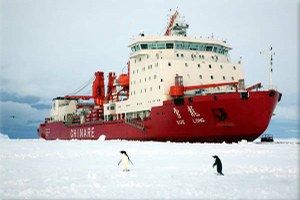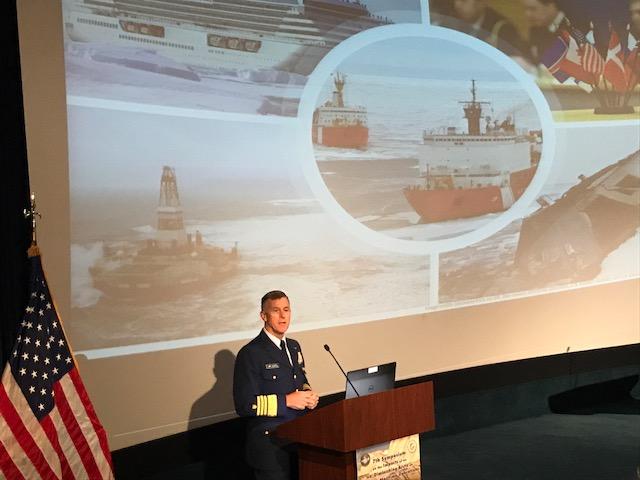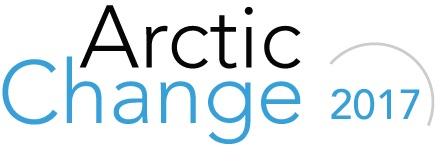|
|
|
|
|
|
|
|
This biennial symposium, co-hosted by U.S. National/Naval Ice Center (NIC) and the US Arctic Research Commission (USARC) focuses on a broad cross-section of naval and maritime operations and issues in an "ice-free Arctic." The symposium brings together nationally and internationally recognized experts on Arctic marine operations, infrastructure, science, environmental observations, and on a wide range of other topics.
In-person registration is now CLOSED (capacity reached, sorry). To get on the waiting list, in case seats open up, please email John Farrell.
Registration (here) remains open for participation via live webcast which will enable participants to ask questions of the speakers.
The detailed program is available online here. Over 50 confirmed speakers...
|
|  | | Sen. Lisa Murkowski |  |
|
|  | | ADM P. Zukunft USCG |  |
|
|  | | Fran Ulmer USARC |  |
|
|  | | Larry Mayer USARC |  |
|
|  | | Sen. Angus King |  |
|
|  | | ADM Thad Allen USCG Ret. |  |
 |
|  | Marie Green USARC |
The movie Sea Blind will be shown, during the symposium's lunch break on Tuesday and Wednesday (July 18 and 19), and the filmmaker, Ms. Bernice Notenboom will be on hand for discussion and questions.
|
 Acidification of Arctic to be Studied on Icebreaker. Acidification of Arctic to be Studied on Icebreaker. The Chinese icebreaker Xuelong, or Snow Dragon, will set out for northern seas on Thursday on a quest to measure the acidification of the Arctic Ocean. It is internationally acknowledged that ocean acidification, mainly caused by rising carbon dioxide emissions, is worsening in the Arctic, according to Xu Ren, deputy head of the Shanghai-based Polar Research Institute of China. It is the first time the institute has targeted Arctic acidification. Ecns
Siberia: Medieval Mummies From Mystery Arctic Civilization Discovered in Zelenyy Yar Necropolis. Two medieval mummies from an Arctic civilization have been discovered at the edge of Siberia. The remains of an adult and a baby were found in the Zelenyy Yar necropolis, an archaeological complex discovered in 1997. They were covered in copper, the adult having been plated from head to toe. Excavations at Zelenyy Yar ended last week, but over the course of this year's expedition to the Arctic site, scientists found 10 graves. Five had not been looted for their "grave goods," valuable objects placed with bodies in ancient burials. Newsweek
Where Else Does the US Have an Infrastructure Problem? Antarctica. The American research station on the edge of this frozen continent may look like a mining camp in the wilderness, but it is actually one of the glories of American science. At McMurdo Station, black volcanic dust boils off unpaved roads, sticking to trucks and buildings. People eat canned vegetables, sleep in windowless rooms and routinely wear 20 pounds of clothes to survive temperatures far below freezing. From its origin as a collection of Navy huts six decades ago, the station here has grown into a small town with more than a thousand residents during peak months. New York Times
 The US is not Ready to Clean up an Arctic Oil Spill. The US is not Ready to Clean up an Arctic Oil Spill. The United States is not ready to clean up an oil spill in the Arctic, the head of the Coast Guard said yesterday. The warning comes as Congress prepares to open up more drilling in a region quickly being transformed by climate change. Adm. Paul Zukunft said that the challenges of cleaning up the BP PLC Deepwater Horizon oil spill in 2010 in the Gulf of Mexico-where the conditions were much more favorable-show the extreme difficulty of Arctic oil spill recovery. Scientific American
Tail that Whale: Researchers Track Orcas in Arctic's Warming Waters. In August 2009, a Canadian research team followed a killer whale swimming in the waters of Admiralty Inlet in the country's Nunavut territory. Once they were about 10m (30ft) away, the researchers used a crossbow to deploy a satellite tag into its dorsal fin. These tags, slightly smaller than a deck of cards, have two metal prongs that stick into the whale's elastic skin and remain embedded there for anywhere from one to three months. In this case, it stayed for 90 days, until the tissue softened up and the tag fell out. Arctic Deeply
How the Arctic Ocean Became Salty. Tens of millions of years ago, the Arctic Ocean was a huge freshwater lake. A land bridge separated it from the salty Atlantic Ocean. Then, around 35 million years ago, that bridge began sinking. Eventually, it fell enough that the Atlantic's salty seawater could seep into the lake. But it hadn't been clear precisely how and when that top-of-the-world lake became an ocean. Until now. A new analysis describes the conditions that allowed the Atlantic's water to overwhelm that Arctic lake, creating the world's northernmost ocean. Its cold, south-flowing water now exchanges with warmer, north-flowing water from the Atlantic. Today, that's what powers the Atlantic Ocean's climate-driving currents. Science News for Students
|
|
Future Events
LECTURE... Sandra Starkweather (NOAA, US AON): The US Arctic Observing Network- Mobilizing Interagency Observing Actions in an Ear of Rapid Change, July 21, 2017 (Washington, DC USA). In September 2016, NOAA and other US agencies submitted a deliverable to the White House Arctic Science Ministerial (WHASM) to formally establish and fund the coordination of a US AON initiative. This US AON initiative brings new coordination capabilities on-line to support and strengthen US engagement in sustained and coordinated pan-Arctic observing and data sharing systems that serve societal needs. US AON promotes the vision of well-defined observing networks that enable users to have access to high quality data that will realize pan-Arctic and global value-added services and provide societal benefits. This talk will describe the capabilities of the new US AON initiative and how those capabilities are being mobilized towards both the "backward" and "forward" problems of Arctic observing. Solving the "backward problem" requires drawing existing observations into interoperable, multi-sensor, value-added data products. Solving the "forward problem" requires the alignment of multiple agency needs and capabilities to coordinate and design the network that is "needed". Both approaches have their own unique benefits and constraints which will be explored during this presentation.
As the Symposium is organized jointly by two leading Research Institutes of Russian Academy of Science - Institute of Water Problems and Melnikov Permafrost Institute, particularly the contributions on following research topics are welcome:
- Observational evidences of change in coupled permafrost-hydrology system.
- Present state and future projections of local, regional and pan-Arctic hydrology.
- Modeling studies representing landscape evolution, dynamics of water storages and permafrost degradation.
- Impacts of permafrost hydrology changes on local communities.
VII International Conference on Cryopedology, August 21-25, 2017 (Yaktsk, Russia). The conference will be hosted by the Institute for Biological Problems of the Cryolithozone of the Siberian Branch of the Russian Academy of Sciences (SB RAS). Plenary reports will be organized in the hall of the Academy of Sciences of the Sakha (Yakutia) Republic. The official languages of the conference are English and Russian (with translation). All technical facilities (projectors, computers, video sets) will be available during the conference for presentation of papers. Additional information will be available soon. See the Facebook page here.
 2017 University of the Arctic Rectors' Forum and Conference, August 27-29, 2017 (Aberdeen, Scotland). This conference will also consider how northern scholarship can add to discussions on the North into broader terrains of intellectual engagement. In so doing, it will challenge dominant paradigms of research in both the natural and the social sciences, above all by calling into question the very separation of the world of nature from that of human society which underwrites the distinction between these two branches of scientific inquiry. In its place the conference will seek to forge a new practice of interdisciplinary research, done in collaboration with northern residents and on their terms, which recognizes that every discipline is itself an ongoing conversation, or a way of knowing, rather than a compartment within an overarching, hierarchically organized system of knowledge. Conversations from the North will, then, help to generate a science that is more open-ended, responsive to environmental variation and respectful of the wisdom of inhabitants. 2017 University of the Arctic Rectors' Forum and Conference, August 27-29, 2017 (Aberdeen, Scotland). This conference will also consider how northern scholarship can add to discussions on the North into broader terrains of intellectual engagement. In so doing, it will challenge dominant paradigms of research in both the natural and the social sciences, above all by calling into question the very separation of the world of nature from that of human society which underwrites the distinction between these two branches of scientific inquiry. In its place the conference will seek to forge a new practice of interdisciplinary research, done in collaboration with northern residents and on their terms, which recognizes that every discipline is itself an ongoing conversation, or a way of knowing, rather than a compartment within an overarching, hierarchically organized system of knowledge. Conversations from the North will, then, help to generate a science that is more open-ended, responsive to environmental variation and respectful of the wisdom of inhabitants.
- Small and off-grid community energy solutions
- Oil and gas development
- Renewable energy
- Regulation and Financing
- Transportation and transmission
The AES is a multi-disciplinary event expected to draw several hundred industry officials, scientists, academics, policy makers, energy professionals and community leaders together to collaborate and share leading approaches on Arctic energy issues.
2017 Arctic Circle Assembly, October 13-15, 2017 (Reykjavik, Iceland). The annual Arctic Circle Assembly is the largest annual international gathering on the Arctic, attended by more than 2000 participants from 50 countries. The Assembly is held every October at the Harpa Conference Center and Concert Hall and is attended by heads of states and governments, ministers, members of parliaments, officials, experts, scientists, entrepreneurs, business leaders, indigenous representatives, environmentalists, students, activists and others from the growing international community of partners and participants interested in the future of the Arctic.
 Polar Law Symposium 2017 and Rovaniemi Arctic Spirit, November 13-16, 2017 (Rovaniemi, Finland). The purpose of the Polar Law Symposium is to examine, in detail, the implications of the challenges faced by the Polar Regions for international law and policy and to make recommendations on appropriate actions by states, policy makers and other international actors to respond to these emerging and re-emerging challenges. The Rovaniemi Arctic Spirit Conference is integrated with the Polar Law Symposium, which will be organized by the Northern Institute for Environmental and Minority Law at the Arctic Center of the University of Lapland. Polar Law Symposium 2017 and Rovaniemi Arctic Spirit, November 13-16, 2017 (Rovaniemi, Finland). The purpose of the Polar Law Symposium is to examine, in detail, the implications of the challenges faced by the Polar Regions for international law and policy and to make recommendations on appropriate actions by states, policy makers and other international actors to respond to these emerging and re-emerging challenges. The Rovaniemi Arctic Spirit Conference is integrated with the Polar Law Symposium, which will be organized by the Northern Institute for Environmental and Minority Law at the Arctic Center of the University of Lapland.
ArcticNet invites the global Arctic research community to Arctic Change 2017! This conference will bring together Arctic researchers and students with Inuit, Northerners and government, industry and NGO stakeholders. The world's foremost Arctic scientists will present research findings and discuss impacts of climate change and modernization. With  over 1500 participants expected, Arctic Change 2017 will be one of the largest trans-sectoral international Arctic research conferences held in Canada. We welcome students and early career researchers to participate in "Student Day" at the start of the Conference. See an excerpt from last year: ArcticNet ASM2016. over 1500 participants expected, Arctic Change 2017 will be one of the largest trans-sectoral international Arctic research conferences held in Canada. We welcome students and early career researchers to participate in "Student Day" at the start of the Conference. See an excerpt from last year: ArcticNet ASM2016.
ISAR-5 Fifth International Symposium on Arctic Research, January 15-18, 2018 (Tokyo, Japan). The fifth ISAR has been planned at the recommendation of the science steering committee of ISAR-4, which was held in Toyama, Japan in April 2015. The fifth ISAR will be devoted to discussions on environmental changes in the Arctic and their regional and global implications, to seek additional international scientific collaboration in this area by gathering, synthesizing and sharing information related to these changes occurring in the Arctic. Special emphasis will be placed on the fields of the social sciences and humanities, which were not included in the previous ISARs. ISAR-5 will consist of general sessions and special sessions. The general sessions will address the following topics: atmosphere; ocean and sea ice; rivers, lakes, permafrost, and snow cover; ice sheets, glaciers, and ice cores; terrestrial ecosystems; marine ecosystems; geospace; policies and economy; and social and cultural dimensions. Special sessions will be solicited on cross-cutting themes.
The Effects of Climate Change on the World's Oceans, June 4-8, 2018 (Washington, DC USA).
The 4th International Symposium will bring together experts from around the world to better understand climate impacts on ocean ecosystems - and how to respond. The event is hosted by a variety of groups including International Council for the Exploration of the Sea (ICES), North Pacific Marine Science Organization (PICES), Intergovernmental Oceanographic Commission of UNESCO (IOC), and Food and Agriculture Organization of the United Nations (FAO).
 POLAR 2018, June 15-27, 2018 (Davos, Switzerland). POLAR2018 is a joint event from the Scientific Committee on Antarctic Research (SCAR) and the International Arctic Science Committee (IASC). The SCAR meetings, the ASSW and the Open Science Conference will be hosted by the Swiss Federal Institute for Forest, Snow and Landscape Research WSL under the patronage of the Swiss Committee on Polar and High Altitude Research. The WSL Institute for Snow and Avalanche Research SLF is organizing POLAR2018. POLAR 2018, June 15-27, 2018 (Davos, Switzerland). POLAR2018 is a joint event from the Scientific Committee on Antarctic Research (SCAR) and the International Arctic Science Committee (IASC). The SCAR meetings, the ASSW and the Open Science Conference will be hosted by the Swiss Federal Institute for Forest, Snow and Landscape Research WSL under the patronage of the Swiss Committee on Polar and High Altitude Research. The WSL Institute for Snow and Avalanche Research SLF is organizing POLAR2018.
Arctic Biodiversity Congress, October 9-11, 2018 (Rovaniemi, Finland). The second Arctic Biodiversity Congress is hosted by the Conservation of Arctic Flora and Fauna (CAFF), the biodiversity working group of the Arctic Council, and the Ministry of the Environment, Finland. The second Arctic Biodiversity Congress will build on the success of the first Congress, held in 2014 in Trondheim, Norway, and will bring together scientists, policymakers government officials, Indigenous representatives, Traditional Knowledge holders, industry, non-governmental organizations, and others to promote the conservation and sustainable use of Arctic biodiversity.
|
|

  
4350 N. Fairfax Drive, Suite 510
Arlington, VA 22203, USA
External links in this publication, and on the USARC's World Wide Web site ( www.arctic.gov) do not constitute endorsement by the US Arctic Research Commission of external Web sites or the information, products or services contained therein. For other than authorized activities, the USARC does not exercise any editorial control over the information you may find at these locations. These links are provided consistent with the stated purpose of this newsletter and the USARC Web site.
|
|
|
|
|
|
|
|
|